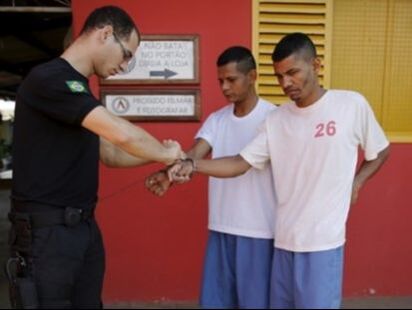|
This month we have a guest blog by Denise Stripes. She shares her thoughts on the second Courageous Conversation that Wilburn & Associates held at the West Central Community Center. I am sure you will enjoy reading what she gathered from the event. The term mass incarceration evokes images of crowds gathered behind bars, but the crowds are faceless, nameless, and dehumanized. When we speak of mass incarceration in the state or federal prison systems, the crowds are not only dehumanized, but they also bear the burden of being classified as criminals. The United States, which holds five percent of the world’s population, imprisons twenty-five percent of the world’s incarcerated population, and more than sixty percent of those imprisoned in the U.S. are people of color. For those of us outside the system, it is effortless to recline in our easy chairs, when hearing these words in the news or on social media, and dismiss the ramifications to those incarcerated by rationalizing that they are criminals, and they deserve what they get. Our consideration stops there, and we go on with our lives. Our complacency, however, carries the risk of making us unwittingly complicit in the injustices that affect the lives of those incarcerated, their families, and ultimately, our community as a whole. For this reason, events such as the conversation hosted on May 4 by Wilburn and Associates, “An Evening of Courageous Conversations: The School to Prison Pipeline and Mass Incarceration,” are not only important, but vital to our communities. This conversation consisted of a presentation by James Wilburn, followed by a panel discussion with eight panel members, all of whom have had some form of experience with the prison system. The event took place at West Central Community Center in Spokane, Washington, and the congenial air of the room, despite the seriousness of the issue, served to unite all present, even among those who disagree on issues. And these issues are important: how are young people getting pushed towards the prison system, even in school? What rights should incarcerated people have? What actually happens to people in the system, and how does it affect their families? Wilburn, in his presentation, gave us some facts, and some context. He defines the School to Prison Pipeline as “a nationwide system of policies that pushes students out of school and into criminal activity.” The push begins when students are disproportionately suspended and expelled due to factors such as race, ethnicity, and any kind of disability. For example, Wilburn reported that thirty-one percent of African-American students experience school-related arrests, and those who are suspended or expelled are three times more likely to encounter the criminal justice system within a year. Nationwide, approximately twice as many black students are expelled than white students. Wilburn then related some factors that contribute to the disparities among the students: teachers who do not use culturally sensitive response practices, developing instead an ineffective, one-size-fits-all response; zero tolerance policies for discipline; lack of alternatives for out-of-school suspensions; lack of evidence practices in dealing with discipline problems; and implicit biases/stereotypes as well as societal fears of African-American males. Wilburn explains the cultural differences between the casual feel of Spokane and those who come from segregated schools, and have had no preparation for dealing with other cultures. The language, dress, and mannerisms all differ from what such students have experienced, which leads to a feeling of dissociation. These factors contribute to a system that sets students up to fail. Wilburn quotes Fredrick Douglass, who said, “It’s easier to build strong children than to repair broken men.” Douglass’s words implore us to deal with the above-stated factors, as well as the system wherein students are policed rather than supported, in order to help more young people to lead free, productive lives, rather than falling into the abyss of mass incarceration. When Wilburn finished his presentation, the panel guests assembled, and suddenly, the faceless crowds we picture when we hear about mass incarceration became real people: Jermal Joe and his wife, Kym Joe, Jason Kiss, Virla Spencer, Duaa Rahemaah Williams, La Tasha Canto, Megan Pirie, and Portia Linear. It’s difficult to retain an air of complacency when speaking face-to-face with these folks. Some, such as Jason, Megan, Virla, and Jermal, have been incarcerated, while others, Kym, La Tasha, and Portia have family members who are or have been incarcerated. Several of the panelists now serve as advocates for prisoners’ rights. When asked what rights prisoners should maintain while incarcerated, practical issues such as the right to vote, while important to the panel, took a back seat to one overarching issue. Linear emphatically stated that those incarcerated should retain the right to their humanity. Linear stressed that prisoners are identified as numbers rather than as people, and are treated as less than human. Coming out of prison, these folks are still defined by others according to their crimes, rather than as human beings. As Kym Joe puts it, “That felony be fresh.” All of the panel members stressed that the system is not working like those of us on the outside think it is, although, in all honesty, those of us on the outside rarely think about how the system works for those on the inside, which is part of the problem. Wilburn asked the panel what rights should be restored when prisoners are released, and the panel first, and most importantly, emphasized the right to live. People who are defined by a past incarceration can face a daunting task in just finding a place to live, getting a job, and parenting their children. The system puts ridiculous obligations in their path, such as fees—sometimes thousands of dollars—that they must pay, classes they must take and pay for, because these classes are not offered in the system, drug treatment that must fit exacting criteria, and other unnecessary red-tape obligations that bog transitioning inmates down, and even lead to re-incarceration. Canto stresses that this re-incarceration is not because of new crime; rather it is because people violate the impossible barriers placed before them. As an example, Pirie is a drug counselor trainee, and is willing to help by teaching some of the classes required, but the Department of Corrections (DOC) will not let her teach because of her past incarceration. One of the most chilling assertions from the panel is that the system causes recidivism not because of mere oversight, but because the state makes money for incarcerating people. Kiss tells us that prisons get paid by bed-space, and so their primary goal is to keep the beds filled. Linear adds that children of previously incarcerated parents are six times more likely to be incarcerated, and that the way officials (law enforcement officials, school officials, etc.) speak to them discourages them from even trying. Linear relates that her nephew was told that “he will never get into college.” Canto asserts that the system is designed to protect white people, and Linear adds that the policies are designed specifically to oppress people of color and families of those incarcerated. Linear attends monthly meetings where these topics are discussed, but she relates that the attendants don’t take the problems seriously. An overarching question that was asked, but not overtly answered, concerns whether punishment works. In a system where prison is for profit, and where the incarcerated become numbers rather than people, one must wonder. And, if the punishment system doesn’t work, the question of solving the issue looms as well, because those who are dehumanized by the system have no outlet for change, and state officials, like Governor Jay Inslee, don’t see the need for a safe space for these folks to air their concerns. Canto related that those in the system are reluctant to approach the offices of those who incarcerate them, because that makes their lives more dangerous than they already are. Spencer spoke of a woman who, when violated by a corrections officer, filed a complaint, but the DOC, who feels no need to justify their actions, retaliated by sending her back to prison. The audience, during the Q & A, offered suggestions for improvement, but it seems that the roadblocks in place negate any of the possibilities. For example, one audience member suggested more panels such as this one, but Canto responded that the state will not sponsor panels with “lived experience” beyond the regional level, and that national conferences, which hold more influence, are limited to people who either have no experience, or who are part of the system. So, what can be done? While concrete answers were lacking, one member of the audience, Nicholas Sironka, suggested that the answer is “not to talk about how [the incarcerated] are there, but to talk about not having others join them.” Nicholas suggested think tanks, strategizing, and touching these individuals, and that “ripples will touch others.” Nicholas added, “Don’t scream, cry—find a solution…and those in prison, let them hear you are doing something.” At the end of the discussion, I had the opportunity to talk with Jermal Joe, who has been in prison for twenty-two years, since age seventeen, and who is transitioning out, and is partially incarcerated. I asked Jermal, if he could say anything to a world that would listen, what would he say? Jermal answered simply, “Second chances are very important.” His answer is poignant, and is a view that many people share. It touches on the complacency of those of us on the outside, who share this view, but don’t bother to know the real situation for people who are lost in the system. As Dr. Roberta Wilburn states, “We cannot let one mistake—or several mistakes—be the reason that we write people off.” It is time to get out of our easy chairs and attend these courageous conversations, because our voices, when combined with those who have lived experience, can help to make a difference.
1 Comment
|
AUTHORRoberta Wilburn is an Inclusion Practitioner with over 35 years of experience working in higher education, and as a consultant in public and private K-12 schools, government, non-profit and community based organizations. She has conducted diversity, equity, and inclusion training regionally, nationally, and internationally. She is the author of books, chapters, and journal articles. Her work has been recognized with local and national awards. Some of her awards include the 2017 Insight Into Diversity Giving Back Award for Administrators in Higher Education, the YWCA Women of Achievement Carl Maxey Racial and social Justice Award, and the Heartwood Award for Cultural Enrichment and Community Service.
ASSOCIATE BLOGGERDenise Stripes has lived in Spokane, Washington for twenty years. She is a wife of a veteran and has three adult children. She is also an adjunct English instructor at Spokane Community College. She earned her doctorate in English Literature from Washington State University. Above all, Denise is a committed believer in Jesus Christ, and wishes to see justice in her community as Christ would show it. She is a firm advocate of the Courageous Conversation, and is honored to write guest blogs about the events facilitated by Wilburn and Associates, LLC.
Archives
April 2020
Categories |


 RSS Feed
RSS Feed